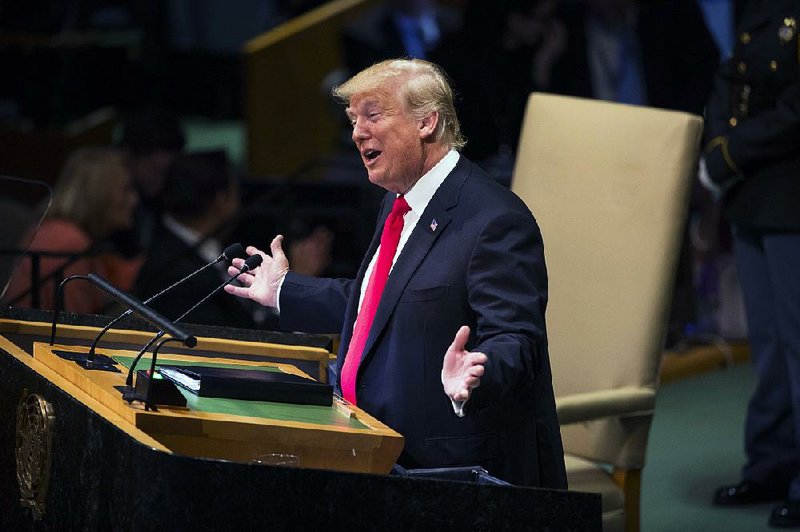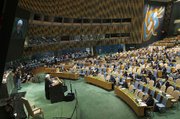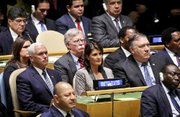NEW YORK -- President Donald Trump and Iranian counterpart Hassan Rouhani traded barbs Tuesday in speeches just hours apart at the United Nations as the U.S. pressed its campaign to isolate the Islamic Republic with new oil sanctions starting in November.
Speaking at the U.N. General Assembly, Trump alleged that Iran's leaders "sow chaos, death and destruction," and he called on the rest of the world to join his administration's "economic pressure" offensive against the nation. Rouhani accused Trump of "economic terrorism" and an "authoritarian" approach to international relations.
The Trump administration is trying to win global support -- or at least acquiescence -- for sanctions the U.S. has imposed on Iran since Trump's decision to withdraw from the 2015 international accord curbing Iran's nuclear program, negotiated under former President Barack Obama. The administration is holding events highlighting its policies against Iran almost every day this week.
Also in his speech, Trump singled out an enemy-turned-partner, Kim Jong Un of North Korea, expressing optimism for a diplomatic opening that would have seemed far-fetched even a year ago.
Today, Trump will host a Security Council session officially focused on nonproliferation, but the president has made clear that he intends to discuss Iranian actions. On Friday, the State Department is hosting an event focusing on human-rights issues in Iran, featuring people it says are former political prisoners.
But in a sign of international resistance to the U.S. stance, foreign ministers from France, the U.K., China, Germany, Russia and the European Union -- the other parties in the nuclear deal -- met on Monday night to discuss ways to keep the accord alive.
EU foreign policy chief Federica Mogherini said after the meeting that the bloc will establish a mechanism to protect European companies' financial dealings with Iran from the effects of U.S. sanctions. And French President Emmanuel Macron said Tuesday that Trump's Iran policy was partly to blame for higher oil prices that the U.S. leader has criticized.
"If he goes to the end of his logic, he'll see that it's good for the oil price that Iran can sell it," Macron said, adding that the president was trying to counter the basic market forces of supply and demand.
But it's not clear whether the financing mechanism the Europeans are discussing would be sufficient to persuade companies to remain committed to business in Iran.
At an anti-Iran event in New York, U.S. Secretary of Secretary Mike Pompeo on Tuesday criticized the European effort as "one of the most counterproductive measures imaginable."
"By sustaining revenues to the regime, you are solidifying Iran's ranking as the No. 1 state sponsor of terror, enabling Iran's violent export of revolution and making the regime even richer while the Iranian people scrape by," he said at the event, hosted by United Against a Nuclear Iran to coincide with the U.N. General Assembly.
National security adviser John Bolton piled on, saying, "The European Union is strong on rhetoric and weak on follow-through."
"So we will be watching the development of this structure that doesn't exist yet and has no target date to be created," Bolton said. "We do not intend to allow our sanctions to be evaded by Europe or anybody else."
Bolton, speaking at the United Against a Nuclear Iran event, warned that there would be "hell to pay" if Iran crossed the U.S., its allies or its partners.
"If you cross us, our allies, or our partners; if you harm our citizens; if you continue to lie, cheat and deceive, yes, there will indeed be hell to pay," he said.
"The murderous regime and its supporters will face significant consequences if they do not change their behavior. Let my message today be clear: We are watching, and we will come after you," Bolton said.
In his speech, Pompeo unveiled a long list of Iranian misdeeds, including its support of Syrian President Bashar Assad and Houthi rebels in Yemen and its sponsoring or plotting attempted terrorist attacks in Africa, Asia, Europe and beyond.
"It is truly an outlaw regime," he said. "There can be no question Iranian destructive activities are truly global in scope. It is therefore incumbent on every country to join our efforts to change the regime's lawless behavior. The ongoing, multinational, multicontinental nature of Iranian malign activity leaves no room for inaction or indecision."
Trump's leverage over Iran has been clear since he withdrew from the agreement in May and the U.S. began phasing in sanctions. The country's currency, the rial, has weakened; inflation and unemployment have climbed; and oil exports are falling. Trump said Tuesday that he wants to see countries significantly cutting their Iranian oil imports by the time new sanctions hit in early November.
Trump used his address to the General Assembly to make a diplomatic case for the U.S. policy.
"We ask all nations to isolate Iran's regime as long as its aggression continues," Trump said.
The country's regime used proceeds from the easing of sanctions after the nuclear accord to increase its military budget 40 percent and strengthen the repression of its people, Trump said, calling the deal "a windfall" for the country's leaders.
Trump blasted what he called Iran's "corrupt dictatorship" and accused its leaders of enriching themselves through embezzlement and raiding state coffers to spread "mayhem."
"Iran's leaders plunder the nation's resources to enrich themselves and to spread mayhem in the Middle East and far beyond," Trump said.
After threatening to "totally destroy" North Korea in his U.N. speech last year, Trump was not as bellicose toward Tehran. "The United States has launched a campaign of economic pressure to deny the regime funds it needs to advance its bloody agenda," he said.
ROUHANI RIPS U.S.
Rouhani in his address portrayed Trump's withdrawal from the nuclear deal and campaign against Iran as an assault on international institutions. He said Trump was using international security as a "toy" for domestic political purposes. He accused the United States of trying to overthrow his government.
"The United States' understanding of international relations is authoritarian," Rouhani said. "In its estimation, might makes right. Its understanding of power, not of legal and legitimate authority, is reflected in bullying and imposition."
Before his speech, Trump tamped down any speculation of a meeting with Iran's leader. "Despite requests, I have no plans to meet Iranian President Hassan Rouhani. Maybe someday in the future," Trump wrote on Twitter. "I am sure he is an absolutely lovely man!"
Iranian officials say they haven't sought a meeting with Trump and wouldn't agree to one. Ali Akbar Velayati, the foreign policy adviser to Iran's supreme leader, Ayatollah Ali Khamenei, called the idea of a meeting a "frenetic dream" of Trump and his top officials that "will never turn reality," according to the state-run Islamic Republic News Agency.
Trump pulled the U.S. out of the 2015 Iranian nuclear accord but signed an agreement in principle with North Korea to abandon its nuclear program. His "maximum pressure" moniker -- previously describing a series of global sanctions against North Korea -- has now been fitted to the administration's approach to Iran.
Bolton said Monday that more sanctions against Iran are ready. And in his speech Tuesday, he called the nuclear deal "the worst diplomatic debacle in American history."
"The days of impunity for Tehran and its enablers are over," Bolton said.
Rouhani said in an interview with NBC News on Monday that Trump's pressure campaign would not bring his government to the negotiating table. The U.S. would have to first rejoin the nuclear accord, he said.
"That bridge must be rebuilt," he said. Meanwhile, Iran can withstand U.S. sanctions, he said, calling the Trump administration's threats to choke off his country's oil exports an "empty promise."
LAUGHTER AT THE U.N.
Trump's 34-minute address drew a mostly stone-faced response from the audience in the General Assembly chamber, which included emissaries from several of the countries he targeted. But there was one moment of levity early on, albeit at the president's expense.
When he declared that his administration had "accomplished more than almost any administration in the history of our country," the audience broke out into murmurs and laughter.
Pausing, Trump said, "I did not expect that reaction." Then he smiled and added, "But that's OK," drawing his only applause of the day.
Later he brushed off the episode, telling reporters: "Oh, it was great. Well, that was meant to get some laughter, so it was great."
Trump lavished praise on his own efforts to shake up the global order in his first 20 months in office, pointing to his withdrawal from the Iran nuclear deal, trade agreements and numerous international organizations, as well as his recognition of Jerusalem as the capital of Israel.
He also celebrated his record as a statesman, asserting that his summit last June in Singapore with Kim, whom he accused of mass murder last year, had reduced the nuclear threat from the North.
"The missiles and rockets are no longer flying in every direction, nuclear testing has stopped, some military facilities are already being dismantled," Trump said. "I would like to thank Chairman Kim for his courage and for the steps he has taken, though much work needs to be done."
The president expressed resentment toward a familiar collection of malefactors: allies, whom he said did not pay their fair share for military defense; trading partners, whom he said exploited unfair agreements that harmed American workers; and oil producers, whom he accused of gouging the United States and other customers.
"OPEC and OPEC nations are, as usual, ripping off the rest of the world, and I don't like it," Trump said. "Nobody should like it."
He also assailed countries, like China, that use industrial planning in their economies to undercut competitors on trade. The United States, Trump said, was systematically renegotiating what he called unfair trade deals. But he also expressed "great respect" for "my friend President Xi," referring to China's leader, Xi Jinping, and thanked him for China's support on North Korea.
The United States' other great strategic rival, Russia, went unmentioned in Trump's speech, except for a fleeting reference to what he described as Germany's dependence on Russian natural gas.
Information for this article was contributed by Toluse Olorunnipa, Nick Wadhams, Justin Sink and Gregory Viscusi of Bloomberg News; by Matthew Lee, Zeke Miller, Jon Gambrell and Jonathan Lemire of The Associated Press; and by Mark Landler of The New York Times.
A Section on 09/26/2018



